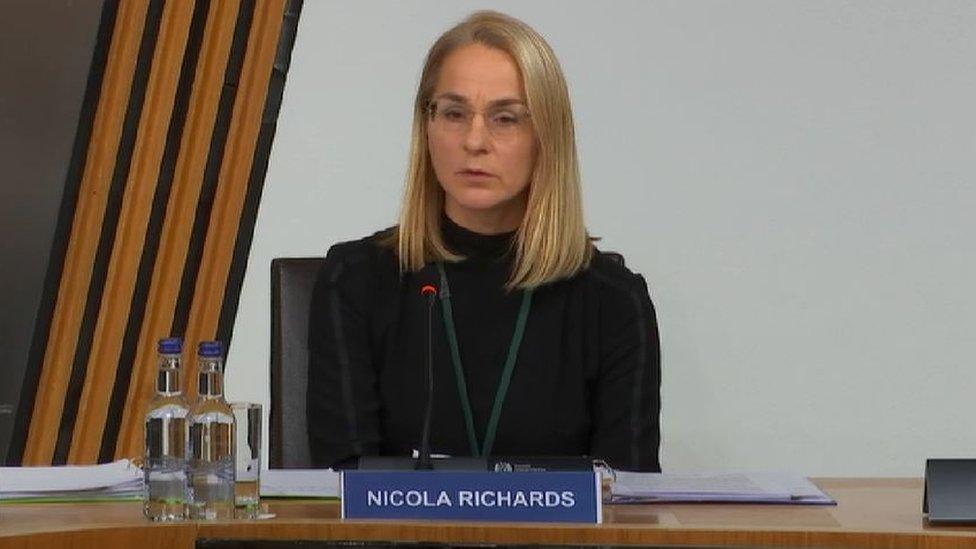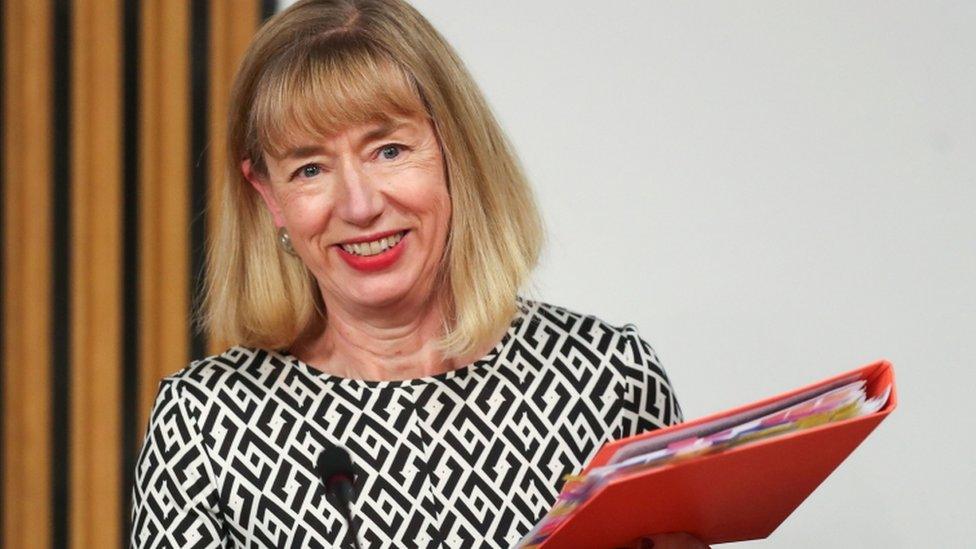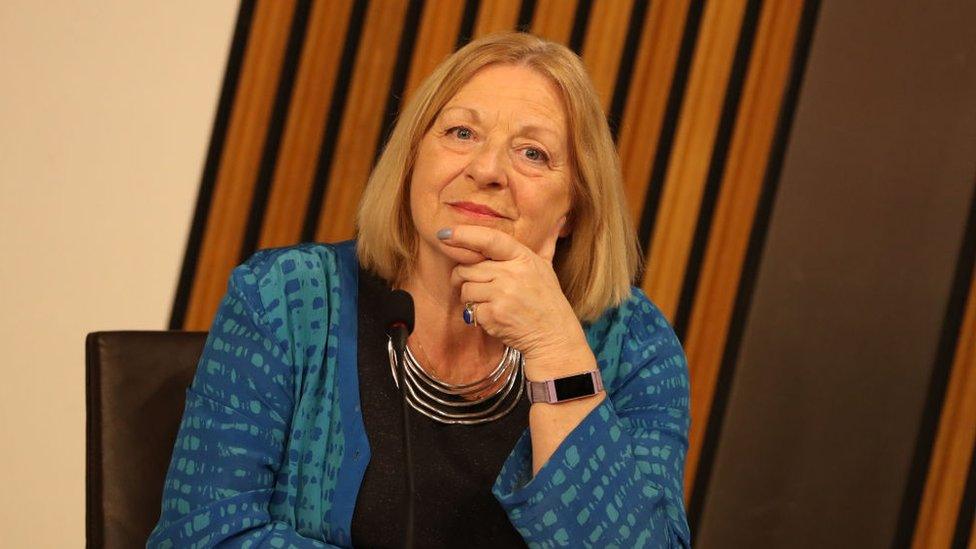Alex Salmond inquiry hears complainers were reluctant to go to police
- Published

Mr Salmond was cleared of 13 charges of sexual assault after his High Court trial in March
The Scottish government reported allegations about Alex Salmond to the police despite the complainers initially being reluctant, an inquiry has heard.
The civil servant who was investigating the claims said the government believed something criminal may have happened.
She said she was asked to "sound out" the two women to see if they would be happy for the police to be involved.
It was eventually the government that passed on the complaints to the police.
Giving evidence to the Holyrood inquiry that is investigating the government's botched handling of the complaints, civil servant Judith Mackinnon denied it was "odd" for it not to have been the complainers themselves who had done this.
Another civil servant, Nicola Richards, later told the inquiry that it had been "very clear" that it was not the wish or preference of the complainants for the allegations against Mr Salmond to be referred to the police.
She said they had been concerned about the impact it would have on themselves and other witnesses, and were worried about the potential loss of anonymity.
But Ms Richards, the government's director of people, said the complainers "fully understood and we were always clear" that the government might have no option but to involve the police.
Ms Richards said it was Leslie Evans, the Scottish government's most senior civil servant, and "senior advisors" who decided that the matter should be referred to Police Scotland.
She added: "By that stage an investigation had taken place, those allegations had been tested, we had been through an internal process. Could we credibly not act on these now?"
However, she said she did not know whether the complainers had given a "specific view" on whether they would be willing to cooperate with a police investigation if the claims were reported by the government.

Nicola Richards said it was "very clear" the complainers were concerned about the impact of the allegations being referred to the police
The government had to pay Mr Salmond £500,000 in legal expenses after admitting ahead of a judicial review that it had acted unlawfully because an investigating officer - Ms Mackinnon - had prior contact with one of the complainers.
Mr Salmond was later cleared of 13 charges of sexual assault by a jury at the High Court in Edinburgh.
Ms Mackinnon told the inquiry that she had been asked in July 2018 to "sound out how the complainers felt about the Scottish government potentially reporting the matter to the police".
She said this had happened after she submitted the final investigation report to Ms Evans, the government's permanent secretary.
She added: "I did that, and I spoke to both complainers. They had some questions, mainly about what the next steps would be, what a police process might look like, and what might be expected of them.
"I contacted one of the officers I had met previously and again it wasn't case-specific, but I was asking her to help me be able to feed back to those individuals about what they could expect as part of a police process."

The committee was told it was Permanent Secretary Leslie Evans who made the decision to refer the complaints to the police
Ms Mackinnon, the government's head of people advice, was asked by Conservative MSP Murdo Fraser whether it would be fair to say that the complainants were "reluctant themselves to report to the police".
She replied: "You could say that. I don't think it had been their intention when they initially came forward to do that."
When Mr Fraser asked whether the complainers would have taken their allegations to the police if the government had not done so, Ms Mackinnon replied: "I can't say that for sure".
However, she later stressed that it would "not be an easy thing" for anyone to involve the police.
And she said the government's policies stated that it may make a referral itself if it believed that something criminal may have happened, adding: "That is exactly what happened in the end".
Ms Mackinnon, who gave her evidence via an audio feed rather than in person, continued: "Before that decision was made there was obviously considerable information and facts gathered about the complainers' experience.
"And with all of the evidence that was finally produced for the deciding officer's report, that decision was obviously felt to be the right one."

Committee convener Linda Fabiani again accused the Scottish government of attempting to obstruct the inquiry
SNP MSP Maureen Watt put it to Ms Mackinnon that this "seems a bit odd" and could look like the government was "encouraging the complainants to go to the police".
Ms Mackinnon replied: "It is very clearly set out in the procedure that individuals could go to the police at any time they wanted to, and it also states that the Scottish government can decide a referral is appropriate."
She said had spoken to the complainers "to take their views into consideration" about this.
Ms Mackinnon, who was giving evidence for a second time, again insisted she was always open about her prior contact with the complainers.
"Nobody had raised a concern about that, they know about it, everyone knew about it," she said.
However, she revealed the Scottish government's legal counsel had not been aware before October 2018.
'Overwhelming' disclosure
Another civil servant later told the inquiry he had not told the first minister that a woman confided in him about allegations of sexual harassment by Alex Salmond.
John Somers - Nicola Sturgeon's principal private secretary - told MPSs the woman only gave him permission to inform his line manager Barbara Allison - the government's communications director.
He said he felt "overwhelmed" by the disclosure and upheld his commitment to keep the details of the conversation secret.
The woman, who is known as Miss A, had potentially been seeking to tell Ms Sturgeon about her experiences and arranged a "personal" meeting with Mr Somers on 20 November 2017.
Mr Somers said: "In the course of that disclosure, Miss A had said to me that there had been experiences in the past that she wanted to share and she wanted to share in a way that would improve the organisation and make sure that no-one else would have to go through that experience again."
Government 'obstruction'
Speaking at the start of the evidence session, committee convener Linda Fabiani again complained of "obstruction" by the Scottish government.
She said the government had handed over 300 pages of documents at 16:45 on Monday, which she said had left no time to process it and have written evidence ready for the session.
The SNP MSP added: "I speak for the committee when I say this is not a satisfactory way to proceed in effective scrutiny, but we will persevere in progressing the task the parliament had tasked this committee to fulfil."
The government has not yet handed over legal advice that it received ahead of the judicial review despite the Scottish Parliament voting on two occasions for it to do so.
But on Tuesday, Deputy Deputy First Minister John Swinney wrote to the committee saying he wanted to propose an "an initial discussion between officials tomorrow at which the government will propose mechanisms to establish an appropriate way forward on this matter".
He added: "I have discussed this issue with Cabinet colleagues this morning and I am keen to consider with you how we might establish a practical way that enables the committee to have access to the information it seeks.
"Ministers are anxious to avoid creating a precedent that will impact negatively on the future ability of Scottish government administrations to seek and receive legal advice in confidence consistent with the long-standing principle of legal professional privilege".